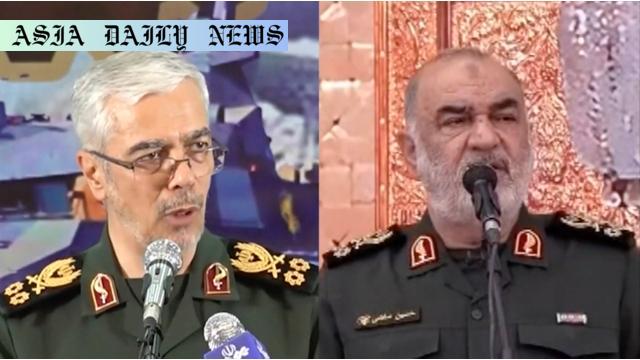Iran commanders: The office of Iran’s supreme leader confirmed the deaths of top military commanders following Israeli strikes.
Iran commanders confirmed killed in Israeli strikes.
Iran vows ‘devastating’ and ‘crushing’ retaliation.
Tensions escalate as leaders pledge response to aggression.

Office of Iran’s Supreme Leader Confirms Casualties
The geopolitical tensions in the Middle East escalated significantly as the office of Iran’s supreme leader officially confirmed the deaths of two top military commanders, Mohammad Bagheri, Armed Forces Chief of Staff, and Major General Hossein Salami, the head of the Islamic Revolutionary Guard Corps. These fatalities were a result of a recent Israeli strike, which occurred on Friday and has ignited outrage within both Iran’s top brass and its citizens. The loss of such pivotal figures has been deemed by Iranian authorities as an unparalleled act of aggression by Israel, further straining their already volatile relations. Within hours of the confirmation, the nation’s military leaders publicly denounced the attack, promising a ‘devastating’ and ‘crushing’ response to what they described as an unjustified and unwarranted act.
Immediate Fallout and Threats of Retaliation
The response from Iran was swift and adamant, with its military and political leaders condemning the strike as blatant provocation. The Islamic Revolutionary Guard Corps (IRGC) issued a chilling statement asserting that enemies of Iran will face grave consequences for their misjudgments. The statement’s wording highlights Tehran’s resolve to enforce a punitive reaction, potentially bringing the region to the brink of a larger conflict. Additionally, the General Staff of Iran’s Armed Forces reiterated the severity of the situation, urging all Iranians to prepare for an intensified defense strategy, elevating worries of military escalation not only among regional powers but also globally.
The Larger Context: Regional Tensions and Implications
This incident serves as a stark reminder of the fragile nature of the Middle East’s political and security landscape. Israel and Iran share a history of hostility, with both nations often engaging in verbal exchanges, accusations, and military posturing. However, this strike and the corresponding loss of senior officials in Iran represent a new level in the antagonism, with potential consequences that could ripple across the region and beyond. Many analysts are predicting retaliatory measures that could manifest in multiple forms, including cyberattacks, proxy engagements, or direct military confrontations. The international community, meanwhile, has maintained a close watch on these developments, urging de-escalation in an effort to prevent a wider conflict.
An Uncertain Future
The current situation leaves the future uncertain, with the potential for a major geopolitical crisis brewing. Leaders from around the world are expected to step in diplomatically to mediate and contain rising hostilities. Tehran’s public grievances and Israel’s position on national security will take center stage in the ongoing negotiations and analyses. Regardless of the outcomes, this episode undoubtedly marks a severe turning point in the dynamics of the Middle East, emphasizing the need for effective communication and restraint to prevent uncontrollable fallout.
Commentary
The Shocking Strike and Its Fallout
The confirmation of the deaths of two of Iran’s most senior military leaders, Mohammad Bagheri and Hossein Salami, is undeniably a massive blow to Iran’s military infrastructure and morale. These men held significant influence, both politically and strategically, within the country and the broader region. Their deaths mark a significant escalation in the long-standing rivalry between Iran and Israel, plunging both nations into an even deeper crisis. Such actions expose the fragility of peace in the Middle East and demonstrate how quickly skirmishes can escalate into larger threats.
Iran’s Reaction: A Vow for Retribution
Iran’s stern promises of devastating retaliation may not merely be rhetoric. Over the past decade, Iran has developed various methods, from engaging proxy groups to waging robust cyber warfare, to secure and extend its influence. In targeting such prominent figures, Israel might have calculated a strategic gain, but it has also inflamed passions in Tehran, opening the door to unpredictable consequences. Iran’s leadership is under pressure not just to avenge these losses but also to demonstrate strength to its populace and allies. The next steps Iran takes will likely grave implications for the region.
Global Implications and the Call for Diplomacy
This incident underscores the urgent need for diplomacy at the international level. The escalation of hostilities in one of the most conflict-prone areas globally invites calls for de-escalation, peace, and restraint. While Israel undoubtedly views its actions as preventive security measures, other nations must step in to mediate before a full-scale conflict erupts. The broader global community must now focus on finding a path forward, perhaps urging compromise and dialogue between the conflicting parties. Such proactive measures are necessary to prevent the loss of more lives and ensure stability in this turbulent region.


